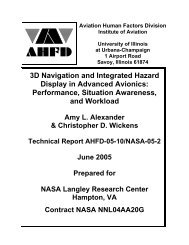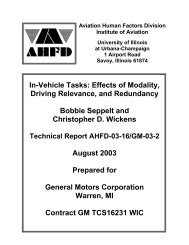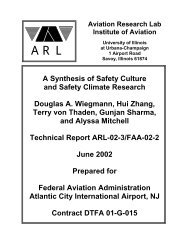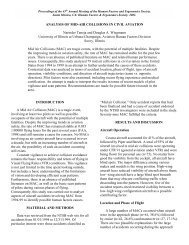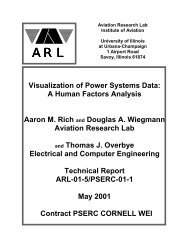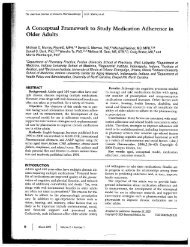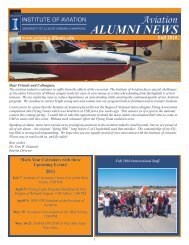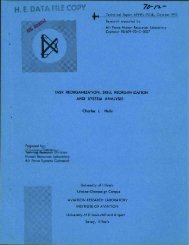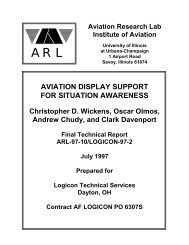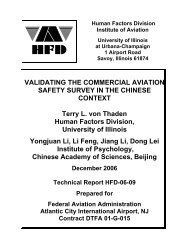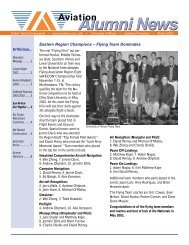Defining and Assessing Safety Culture in High Reliability Systems
Defining and Assessing Safety Culture in High Reliability Systems
Defining and Assessing Safety Culture in High Reliability Systems
Create successful ePaper yourself
Turn your PDF publications into a flip-book with our unique Google optimized e-Paper software.
Gordon, R. P. E. (1998). The contribution of human factors to accidents <strong>in</strong> the offshore oil<br />
<strong>in</strong>dustry. <strong>Reliability</strong> Eng<strong>in</strong>eer<strong>in</strong>g <strong>and</strong> System <strong>Safety</strong>, 61, 95-108.<br />
Literature on human errors, human factors, <strong>and</strong> how they contribute to accidents <strong>in</strong> the offshore<br />
oil <strong>in</strong>dustry is reviewed. Based on the analysis of 25 accident report<strong>in</strong>g forms from offshore oil<br />
companies <strong>in</strong> the UK sector of the North Sea, an improved framework of accident report<strong>in</strong>g<br />
forms is proposed. This framework uses human error categories to determ<strong>in</strong>e the immediate<br />
cause of the accidents, <strong>and</strong> human factors categories to determ<strong>in</strong>e the underly<strong>in</strong>g causes of the<br />
accidents. Human errors are def<strong>in</strong>ed <strong>in</strong> terms of the type of activity that is be<strong>in</strong>g performed (skill,<br />
rule, or knowledge based). Skill based slips <strong>and</strong> lapses <strong>in</strong>clude “action” <strong>and</strong> “check<strong>in</strong>g”, rule<br />
based mistakes <strong>in</strong>clude “retrieval” <strong>and</strong> “transmission”, <strong>and</strong> knowledge based mistakes <strong>in</strong>clude<br />
“diagnostic” <strong>and</strong> “decision” errors. Human factors consist of three ma<strong>in</strong> categories:<br />
organizational factors which <strong>in</strong>clude company policies, company st<strong>and</strong>ards, systems <strong>and</strong><br />
produces; group factors which <strong>in</strong>clude management weaknesses, supervision <strong>and</strong> crew factors;<br />
<strong>and</strong> <strong>in</strong>dividual factors which <strong>in</strong>clude competence, stress <strong>and</strong> motivation. Also, the methods by<br />
which accidents could be reduced is discussed by focus<strong>in</strong>g on the human factors, such as<br />
feedback from accident report<strong>in</strong>g <strong>in</strong> the oil <strong>in</strong>dustry, audit<strong>in</strong>g of unsafe acts <strong>and</strong> latent failures.<br />
Gordon, R., Fl<strong>in</strong>, R., Mearns, K., & Flem<strong>in</strong>g, M. T. (1996). <strong>Assess<strong>in</strong>g</strong> the human factors<br />
causes of accidents <strong>in</strong> the offshore oil <strong>in</strong>dustry. Paper presented at the Third International<br />
Conference on Health, <strong>Safety</strong> <strong>and</strong> Environment <strong>in</strong> Oil <strong>and</strong> Gas Exploration <strong>and</strong><br />
Production. New Orleans, LA.<br />
The importance of human factors <strong>in</strong> <strong>in</strong>dustrial safety <strong>and</strong> the role of human factors <strong>in</strong> reduction<br />
of accidents were discussed. Human factors codes <strong>in</strong> high reliability <strong>in</strong>dustries such as the<br />
nuclear, m<strong>in</strong><strong>in</strong>g <strong>and</strong> mar<strong>in</strong>e were reviewed. Based on a review of the current accident cod<strong>in</strong>g<br />
systems used by 30 offshore oil operat<strong>in</strong>g <strong>and</strong> contract<strong>in</strong>g companies <strong>in</strong> the UK, a more<br />
comprehensive human factor cod<strong>in</strong>g category for accident report<strong>in</strong>g systems was presented. This<br />
cod<strong>in</strong>g system <strong>in</strong>cludes three ma<strong>in</strong> themes:<br />
(1) Organizational/management factors, which <strong>in</strong>clude company policies <strong>and</strong> st<strong>and</strong>ards <strong>and</strong><br />
management weaknesses,<br />
(2) Job factors, which <strong>in</strong>clude supervision <strong>and</strong> task, <strong>and</strong><br />
(3) Personal factors, which <strong>in</strong>clude capability, knowledge/skill, stress, <strong>and</strong> improper motivation.<br />
This cod<strong>in</strong>g system is <strong>in</strong>tended to be used for accident report<strong>in</strong>g, safety tra<strong>in</strong><strong>in</strong>g <strong>and</strong> for rais<strong>in</strong>g<br />
awareness of the human factors causes of accidents.<br />
16



